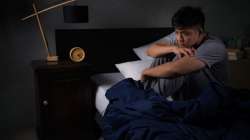Bedtime routine: Tips to ensure a good night’s sleep
Bedtime routine: It is very important to find efficient ways to get quality sleep because sleep loss can cause a wide range of health issues. Here are the tips to make yourself relaxed at night.

After a night spent tossing and turning, you wake up feeling annoyed and grumpy. Restless nights and weary mornings can become more frequent as we get older, and our sleep patterns change. Later in life, there tends to be a decrease in the number of hours slept. There are also some changes in the way the body regulates circadian rhythms. This internal clock helps your body respond to changes in light and dark. When it undergoes a shift with age, it can be harder to fall asleep and stay asleep through the night.
We all have trouble sleeping from time to time, but when insomnia persists day after day, it can become a real problem. Beyond making us tired and moody, a lack of sleep can have serious effects on our health, increasing our propensity for obesity, heart disease, and type 2 diabetes.
You don’t have to avoid sleep aids if you absolutely need them, but before you turn to pills, try these tips to help you get a better night’s sleep:
1. Exercise:
Going for a daily brisk walk won’t just trim you down, it will also keep you up less often at night. Exercise boosts the effect of natural sleep hormones such as melatonin. Exercising too close to bedtime can be stimulating. Morning workouts that expose you to bright daylight will help the natural circadian rhythm.
2. De-stress:
Stress is a stimulus. It activates the fight-or-flight hormones that work against sleep. Give yourself time to wind down before bed. Learning some form of relaxation response can promote good sleep and can also reduce daytime anxiety. To relax, try deep breathing exercises. Inhale slowly and deeply and then exhale.
3. Start a sleep ritual:
A set of bedtime rituals can help signal the body and mind that it's coming to be time for sleep. Drink a glass of warm milk. Take a bath or listen to calming music to unwind before bed.
4. Avoid alcohol and caffeine:
If you do have a snack before bed, wine and chocolate shouldn't be part of it. Chocolate contains caffeine, which is a stimulant. Surprisingly, alcohol has a similar effect. It makes you a little sleepy, but it's a stimulant and it disrupts sleep during the night. Also stay away from anything acidic (such as citrus fruits and juices) or spicy, which can give you heartburn.
5. Get yourself checked:
An urge to move your legs, snoring, and a burning pain in your stomach, chest, or throat are symptoms of three common sleep disrupters including restless leg syndrome, sleep apnea, and gastroesophageal reflux disease. If these symptoms are keeping you up at night or making you sleepy during the day, see your doctor for an evaluation.